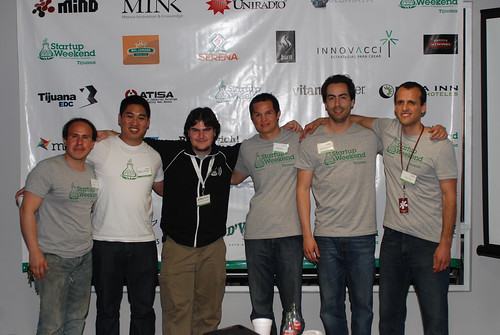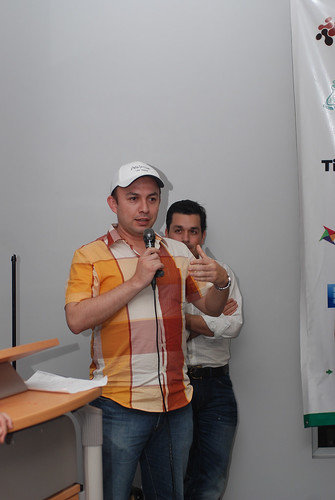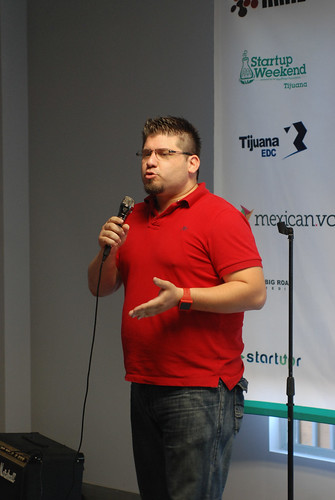Coming to Tijuana for
Startup Weekend was the first time I had ever set foot in Mexico, which now seems like a crime considering that I have lived less than an hour from the border for three years. The people I met, talent I saw and food I ate has made me fall in love with the city, and has got me seriously considering if I want to live there for a bit sometime down the line.
Below are some takeaways I got from SWTJ
Wait what’s Startup Weekend (SW)?
 |
| SWTJ organizers and Wes, my boss from Ansir Innovation Center |
Startup Weekend is a 54 hour competition, where attendees pitch a startup idea on Friday, form teams around the highest voted ideas and then build and hopefully launch that idea over the rest of the weekend. Throughout the weekend, teams receive guidance from local entrepreneurs who volunteer their time. On Sunday, the teams give a final pitch and are judged on what they have built. Startup Weekend is a nonprofit organization that is funded by the Kaufman Foundation, which seeks to develop entrepreneurship around the world. There have been SW events all over the world, from San Francisco to Shanghai and even Gaza. Even more impressive, all the events have been organized by unpaid and overworked volunteers, so you know there is a lot of passion floating around every event.
“Wow this looks like China!”
After crossing the border and seeing the shacks and rundown houses next to brand new glass office buildings and shopping malls, I was immediately reminded of China. Tijuana (TJ) is no Shanghai, but with its cracks of modernity in an otherwise overwhelmingly developing city. It looks like a 3rd or 4th tier city in the interior of China, maybe a Jingdezhen or Shangcai.
 |
| In the blue house right next to the MindHub office lives a family that raises roosters for cockfighting. |
With that in mind, I was really hoping to see Startup Weekend projects that would keep the average Mexican consumer in mind. Talking to a few of the organizers and attendees before the initial pitches, I learned that broadband access is prohibitively expensive and furthermore very slow. Someone told me that just 35% of Mexicans actually use the internet as compared to the US where it is around 60%. In addition, smartphone penetration in Mexico is low and most smartphone owners did not have data plans, something which I noticed myself while interacting with the SW attendees. I was also told that compared to most of Mexico, TJ was a bit ahead of the curve so internet usage and smartphone ownership was slightly above average.
Differences between American SWs and SWTJ
Most of the mentors and organizers were in hardware or enterprise software, which is a huge difference from the US where I see mentors and organizers who are from predominantly consumer oriented web, mobile and local backgrounds. In SWTJ, the large majority of attendees were developers and there was a huge shortage of business development talent, which is the complete opposite problem that I have witnessed in the US. In addition, the SWTJ attendees seemed to be more one dimensional, only knowledgeable in their respective disciplines, than American SW attendees.
Facebook is King
Jorge B., a social media marketer, said that social media in Mexico is dominated by Facebook and estimated that maybe 2% of Tijuanenses use Twitter. Previously, Jorge’s marketing firm was located in San Diego and since moving to TJ he has noticed that there is big gap between US and Mexico in terms of talent and funding.
My one criticism
 |
Jorge
MindHub Co-founder |
After the initial pitches and a late night snack of delicious street tacos, I expressed my disappointment about the lack of consideration for the average Mexican in nearly all of the ideas to Jorge, co-founder of
MindHub which is the office which we were holding SWTJ at. Jorge told me that he was not surprised since TJ is very different from the rest of Mexico due to its proximity to the border. He explained the bicultural nature of the city and emphasized this by telling me that he “grew up watching Sesame Street.” Jorge pointed to the relatively young age of the competitors combined with the biculturalism as the reason for the lack of connection to developing world problems.
Tijuana is not dangerous
 |
| The only sign that there might be something going on. |
Before and after coming to TJ, I was asked and warned about it being dangerous. However, when I talked to Omar, one of the organizers, about it I was told that there has not been a cartel shooting in over a year. Omar explained that the violence still persists in cities like Juarez and Monterey but in TJ the only sign that there is a battle against the drug cartels are the occasional trucks of soldiers on the street. Tourism from the US has not recovered since the explosion of violence, which is a shame, because it is safe and there are plenty of European and Mexican tourists who have realized this.
I see a bright future
 |
| Presenter from the winning SWTJ team |
On the last day of SWTJ, I asked a few of the organizers if they could name me one up and coming tech company in Mexico. No one could. After seeing the final pitches, I hope that will change because I was blown away by the results, especially in the design department. Perhaps, if San Diego and Tijuana pool their talents something amazing could happen sooner than later?






No comments:
Post a Comment